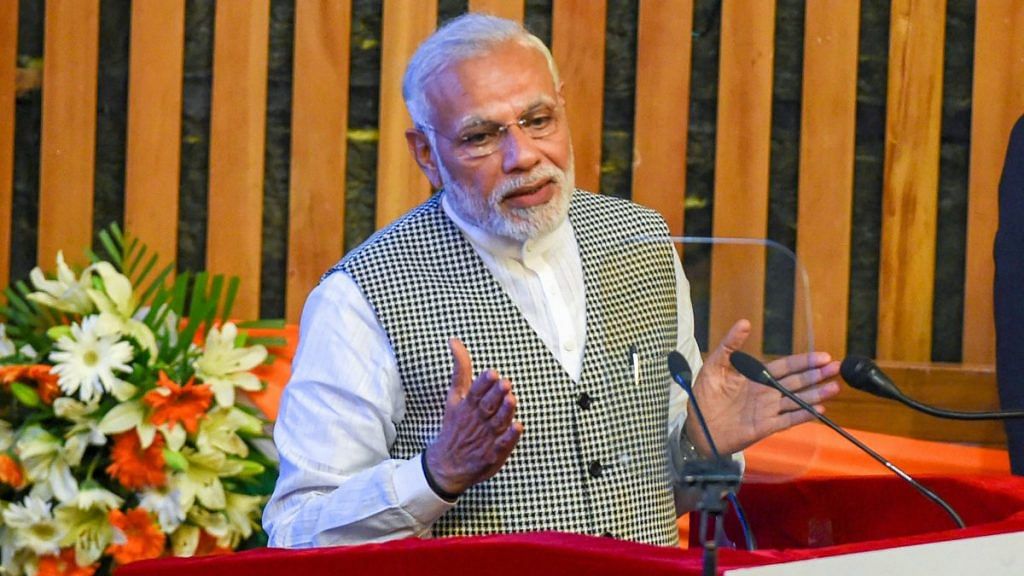At the joint press conference with US President Donald Trump on the sidelines of the G7 Summit in France, Prime Minister Narendra Modi conveyed one message unambiguously. He made it clear to America and the world that all issues between India and Pakistan are bilateral and ensured the international community accepts India’s viewpoint on abrogation of Article 370.
In the three weeks between Jammu and Kashmir losing its special status and the Modi government making the international community, barring China, endorse its stand, the developments prove that India’s short-term strategy has been very successful. The situation on the ground in Kashmir is under control. The unprecedented deployment of the security forces, the Valley’s curfewed streets, and the ‘information blackout’ have ensured there are no mass protests – violent or peaceful – and there is no loss of life.
But while the Modi government has achieved its immediate political aim, India’s long-term strategy remains unclear. Except for vague political rhetoric, one has heard little about the government’s plans for Kashmir in the long run. Have we reconciled to the idea of controlling the territory of J&K without the ‘soul’ of its people?
If the Modi government intends to win the hearts and minds of Kashmiris, then it has an endless ‘to do’ list to follow, which has been discussed ad nauseam. Here are some recommendations based on my experience.
Also read: Demonetisation, GST, now Kashmir. Modi govt doesn’t think beyond the first step
Us versus them
‘People of India’ versus the ‘Muslim population of Jammu and Kashmir’ is the predominant narrative. The politicians, the public and the media have fallen prey to it. Little or no distinction is made between the Kashmiris and the terrorists. This narrative is against the norms of a civilised society.
Of course, violence in Jammu and Kashmir to a large extent has been the principal cause for tensions, but are we going to punish 8.5 million people for the crimes of 250-odd terrorists? If this narrative percolates down to the armed forces, the early signs of which, in my view, are discernible, the consequences will be horrendous.
This narrative has to change. As a nation, we cannot lose our moral compass.
Appeal to emotions
It is empirical wisdom that no matter how aggrieved the people may be, an emotional appeal by the highest authority can bridge the gap to a great degree. That is exactly what former Prime Minister Atal Bihari Vajpayee and his successor Manmohan Singh did, paving the way for the situation in Kashmir to be brought to near-normal by 2012.
So far, the Modi government hasn’t, either in its first tenure or in the second, taken any such action. Prime Minister Modi should go beyond a televised gesture and make a direct emotional appeal to the people of Jammu and Kashmir explaining his political strategy, plans for their development and well-being, and his approach to reconciliation.
Also read: The sheer folly of Modi govt’s media managers plotting a Kashmir-is-normal story
Development plans
The short-term and the long-term development plans must be spelt out in concrete terms detailing when and how they will be carried out instead of being simply announced as rhetorical promises.
The short-term development plans and welfare measures must fructify fast and their impact must be visible for the people to see in the near future.
Rope in the youth
The key to Jammu and Kashmir’s future are the post-1989 youth who have seen nothing but violence. Many of them are educated and aspirational. Lack of jobs and the prevailing circumstances have resulted in frustration and “anti-national” sentiments among the youth. When these sentiments fester for far too long, the gun is only one step away.
As a nation, we must take affirmative action to employ the youth of Jammu and Kashmir. The Modi government must guarantee them the right to work and launch a stipend scheme as per qualifications as soon as possible.
Also read: Modi govt’s Kashmir crackdown is damaging India’s image abroad
Education and health
Good education and healthcare are basic rights of the country’s citizens. Improvement in both never fails to touch the hearts of the people. We must transform these two sectors in Jammu and Kashmir and make it a model for the whole country.
A large segment of the population has been psychologically affected by violence for years. This problem has to be specifically addressed.
National effort
Let there be no doubt that Jammu and Kashmir or any part of it is not going anywhere. It was and will remain an inalienable part of India. The choice is ours whether we would like to keep it with or without the ‘hearts and minds’ of the people who live there. This is not the time for triumphalism but for reconciliation.
If we the people and our elected government show the wisdom and the will, Jammu and Kashmir can be a model for the rest of the country in five years.
Lt Gen H S Panag PVSM, AVSM (R) served in the Indian Army for 40 years. He was GOC in C Northern Command and Central Command. Post retirement, he was Member of Armed Forces Tribunal. Views are personal.
